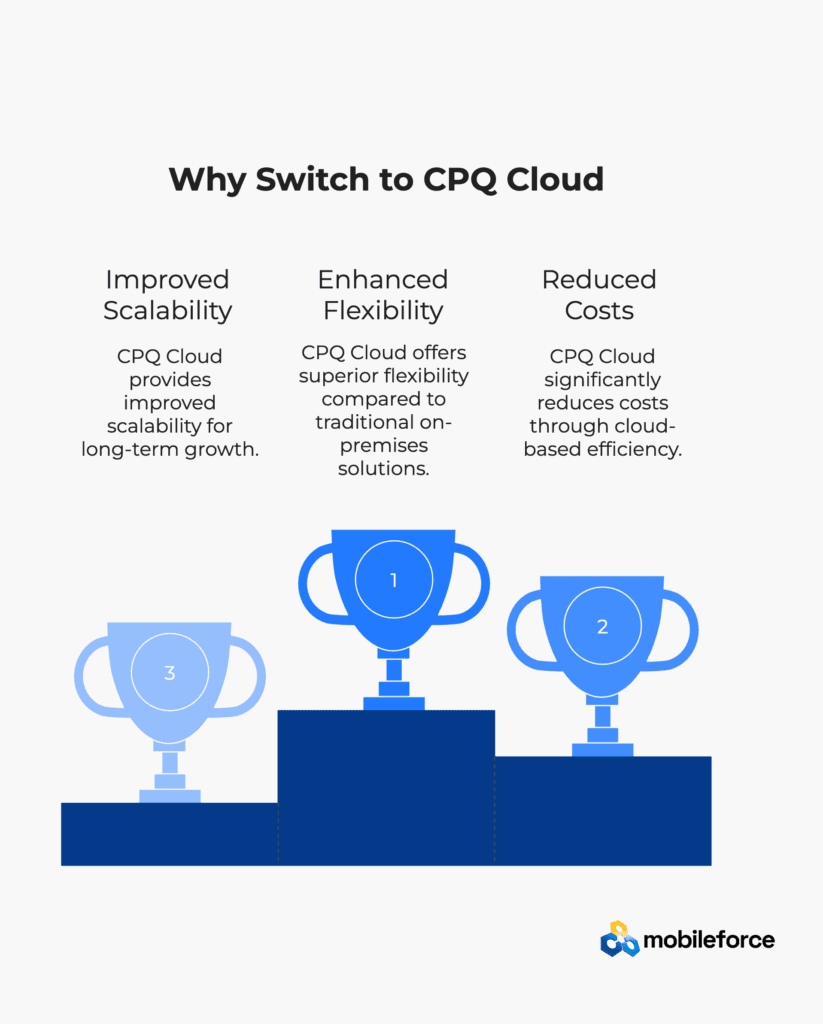- Home
- Glossary Term
- CPQ Cloud
Introduction
Configure, Price, Quote (CPQ) Cloud represents a transformative approach to sales automation that has revolutionized how businesses manage complex product configurations, pricing strategies, and quote generation. As enterprises increasingly adopt cloud-based solutions, CPQ Cloud has emerged as a critical technology for streamlining the quote-to-cash process while enhancing customer experiences and driving revenue growth.
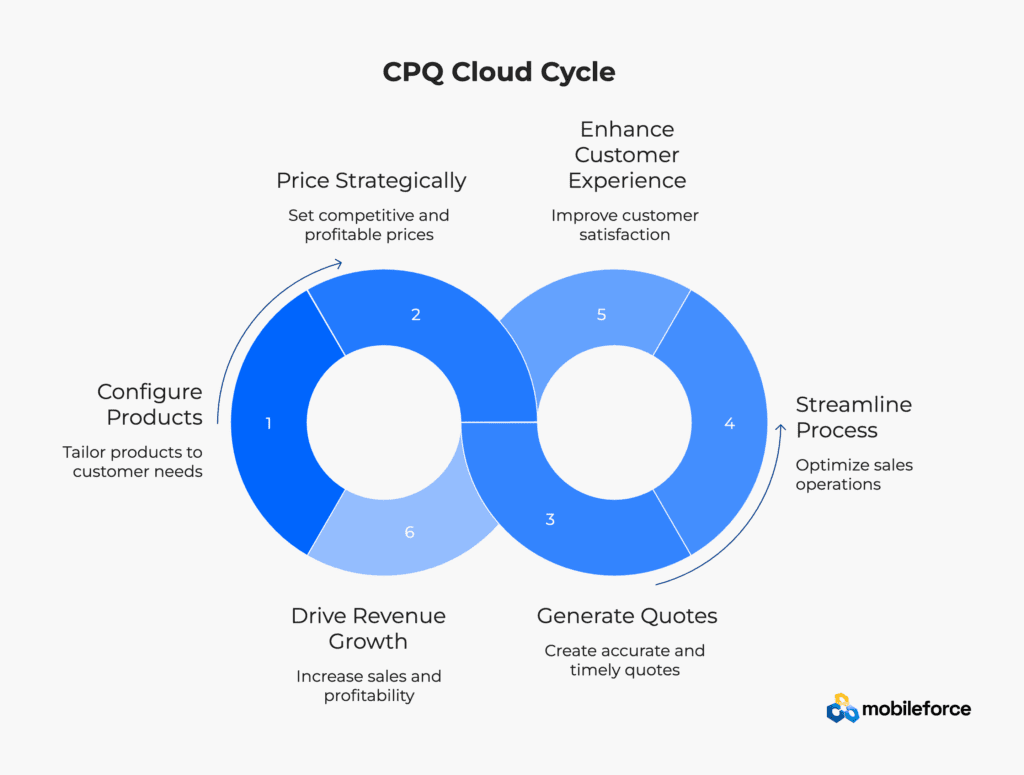
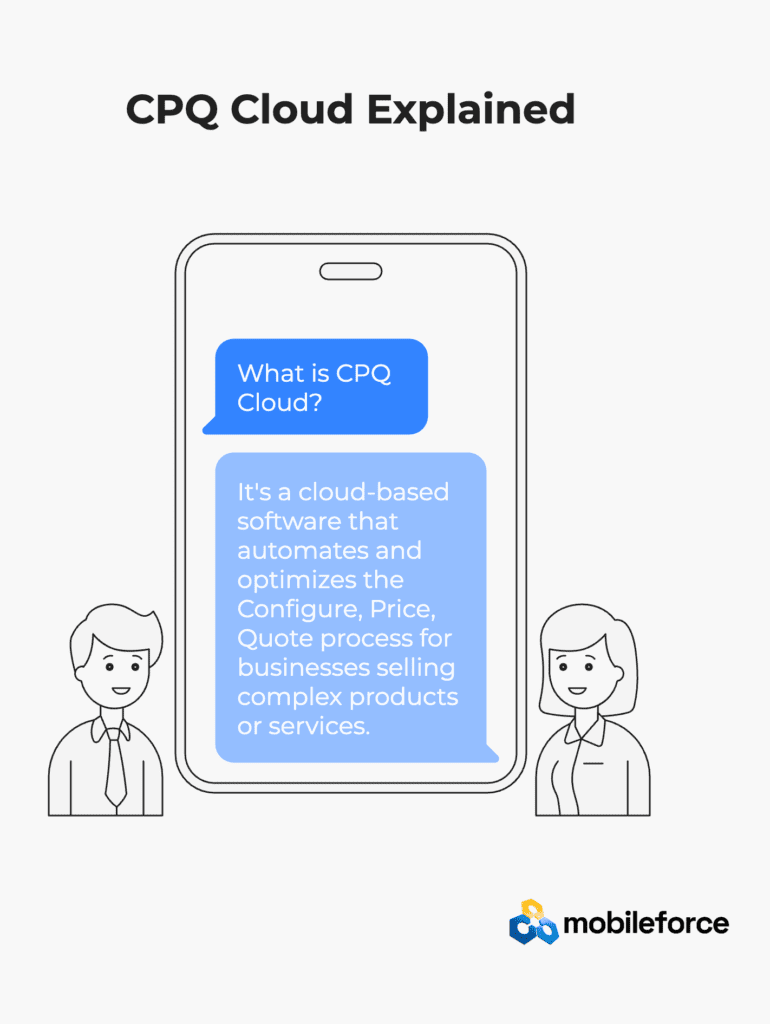
What is CPQ Cloud?
CPQ Cloud is a cloud-based software solution that automates and optimizes the Configure, Price, Quote process for businesses selling complex products or services. Unlike traditional on-premises CPQ systems, cloud-based solutions are hosted remotely by vendors and accessed through web interfaces, providing greater flexibility, scalability, and accessibility.
The Configure component enables sales teams to build valid product combinations based on predefined rules and dependencies, ensuring technical feasibility while preventing incompatible configurations. The Price functionality automatically calculates optimal pricing based on complex variables including volume discounts, customer-specific agreements, market conditions, and promotional offers. The Quote stage generates professional, detailed proposals that compile all configuration details and pricing information into formatted documents ready for customer review.
Modern CPQ Cloud solutions integrate seamlessly with CRM and ERP systems, creating unified platforms that support the entire sales lifecycle from lead generation through revenue recognition.
Core Components and Functionality
Product Configuration Engine
The configuration engine serves as the foundation of CPQ Cloud solutions, providing intelligent product modeling capabilities that handle complex relationships, dependencies, and compatibility rules. Advanced configuration engines support multi-dimensional product catalogs with thousands of options while maintaining performance and accuracy.
Interactive product configurators offer 2D and 3D visualization capabilities that enhance the customer experience by providing visual representations of configured products. These interfaces guide users through the configuration process with behavior-driven questionnaires that identify customer requirements and recommend optimal solutions.
Dynamic Pricing Management
CPQ Cloud platforms implement sophisticated pricing engines that support multiple pricing models including subscription-based, usage-based, and one-time purchase structures. Dynamic pricing capabilities automatically apply complex discount structures, promotional offers, and customer-specific pricing agreements while maintaining margin requirements.
The pricing component handles multi-currency transactions, foreign exchange rate calculations, and regional pricing variations to support global operations. Advanced margin management features provide real-time profitability analysis and automated approval workflows for discounts exceeding predefined thresholds.
Quote Generation and Document Management
Professional quote generation capabilities create branded proposals that incorporate all product details, pricing information, and contract terms in clear, comprehensive formats. Document generation engines support customizable templates and automated formatting to ensure consistency across all customer communications.
Electronic signature integration streamlines the approval process by enabling customers to review and execute contracts digitally, accelerating deal closure times and reducing administrative overhead.
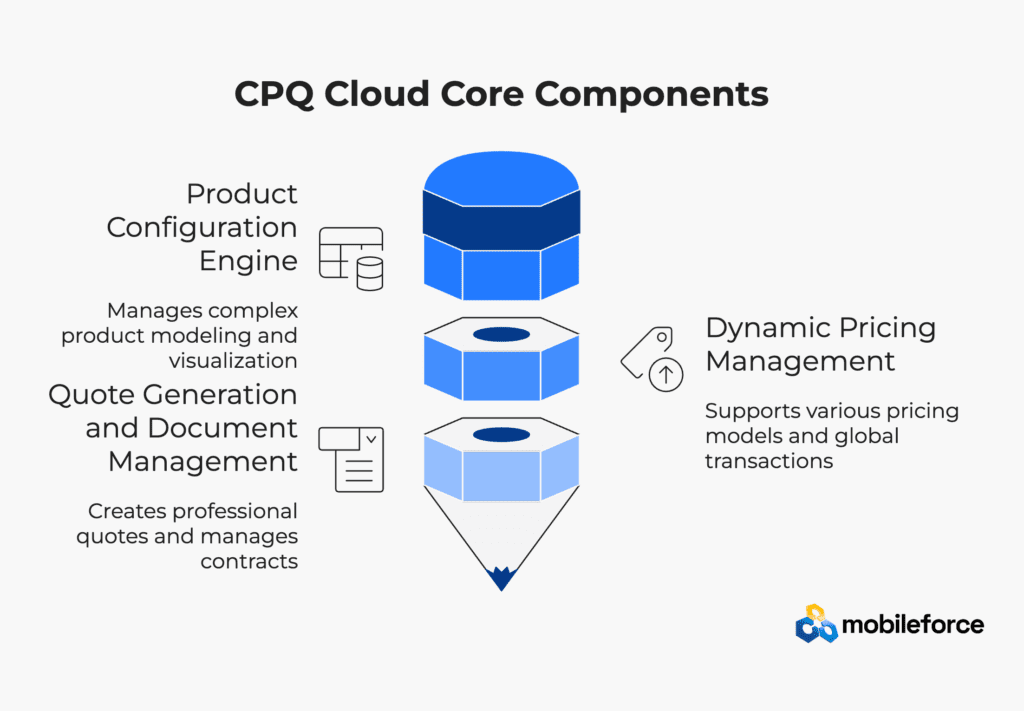
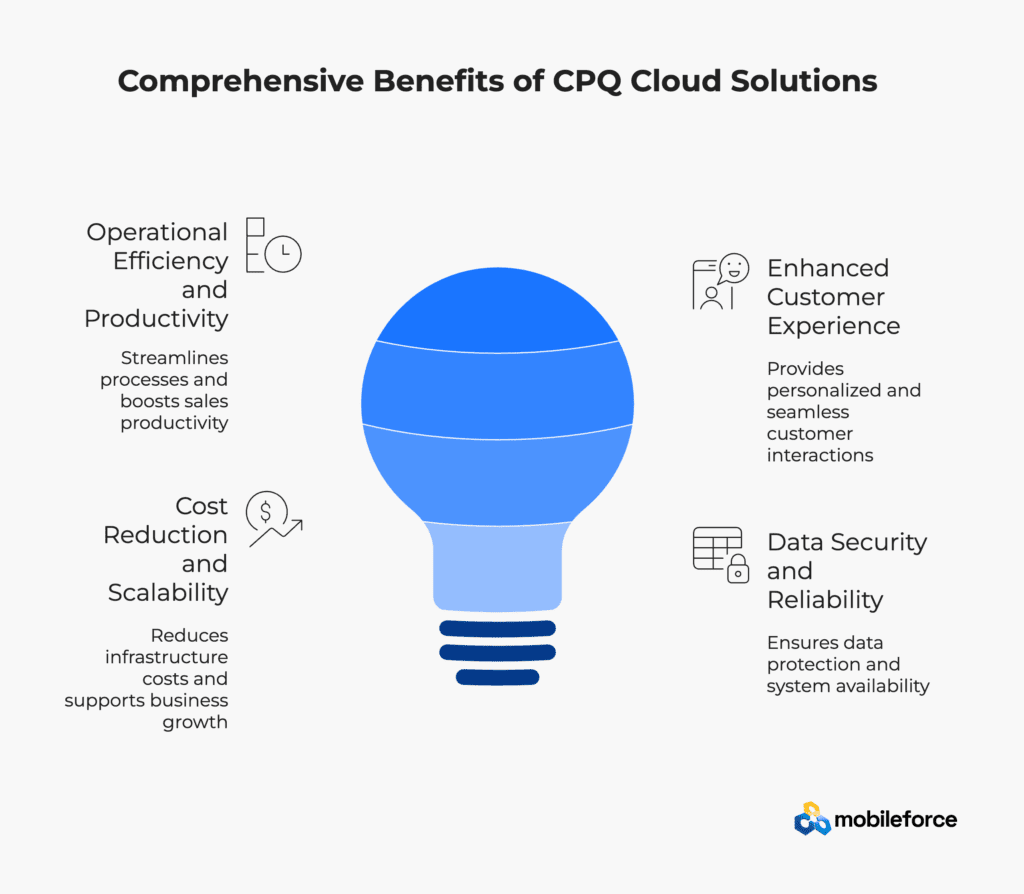
Key Benefits of CPQ Cloud Solutions
Operational Efficiency and Productivity
CPQ Cloud solutions deliver significant efficiency improvements through automation of manual processes and elimination of repetitive tasks. Sales representatives can generate accurate quotes in minutes rather than days, increasing productivity and enabling focus on high-value customer interactions.
Organizations implementing CPQ solutions typically experience 49% increases in sales productivity, 28% shorter sales cycles, and 26% increases in average deal sizes. These improvements result from reduced administrative burden, faster approval processes, and enhanced accuracy in pricing and configuration.
Enhanced Customer Experience
Cloud-based CPQ platforms enable superior customer experiences through personalized product configurations, accurate pricing, and rapid quote delivery. Self-service capabilities allow customers to configure products independently, reducing dependency on sales resources while improving satisfaction.
Real-time quote generation and transparent pricing build customer confidence while omnichannel accessibility ensures consistent experiences across direct sales, partner channels, and self-service portals.
Cost Reduction and Scalability
CPQ Cloud solutions eliminate significant infrastructure costs associated with on-premise deployments while providing predictable subscription-based pricing models. Organizations avoid substantial upfront hardware investments, ongoing maintenance expenses, and dedicated IT resources required for on-premise solutions.
Cloud platforms offer inherent scalability that accommodates business growth without additional infrastructure investments, enabling organizations to expand user access, product catalogs, and transaction volumes seamlessly.
Data Security and Reliability
Leading CPQ Cloud providers implement enterprise-grade security measures including data encryption, role-based access controls, and compliance with industry standards such as SOC 2 Type 2 and ISO 27001. Robust security infrastructures managed by cloud vendors often exceed the capabilities of internal IT departments.
Automated backup systems and disaster recovery capabilities ensure data protection and business continuity, while high availability architectures minimize downtime and ensure consistent system access.
Cloud vs. On-Premises Deployment Considerations
Deployment and Implementation
Cloud CPQ solutions offer rapid deployment capabilities with minimal IT involvement, enabling organizations to implement systems quickly without extensive infrastructure setup. Standard deployment times for cloud solutions range from weeks to months compared to the extended timelines required for on-premises implementations.
On-premises deployments require substantial internal IT resources for installation, configuration, and ongoing maintenance, while cloud solutions transfer these responsibilities to experienced vendors with specialized expertise.
Customization and Control
On-premises solutions provide extensive customization capabilities and complete control over system configurations, data management, and security protocols. Organizations requiring deep customization or specific compliance requirements may benefit from the flexibility offered by on-premises deployments.
Cloud solutions typically offer limited customization options compared to on-premises alternatives, though modern platforms provide sufficient configuration capabilities to meet most business requirements through web-based interfaces and API integrations.
Cost Structure and Financial Implications
Cloud CPQ solutions operate on subscription-based pricing models that reduce initial capital requirements and provide predictable operating expenses. Total cost of ownership comparisons consistently favor cloud deployments due to reduced infrastructure, maintenance, and support costs.
On-premises solutions require significant upfront investments in hardware, software licenses, and implementation services, followed by ongoing expenses for maintenance, upgrades, and support. These cost structures may be prohibitive for smaller organizations or those seeking rapid implementation.
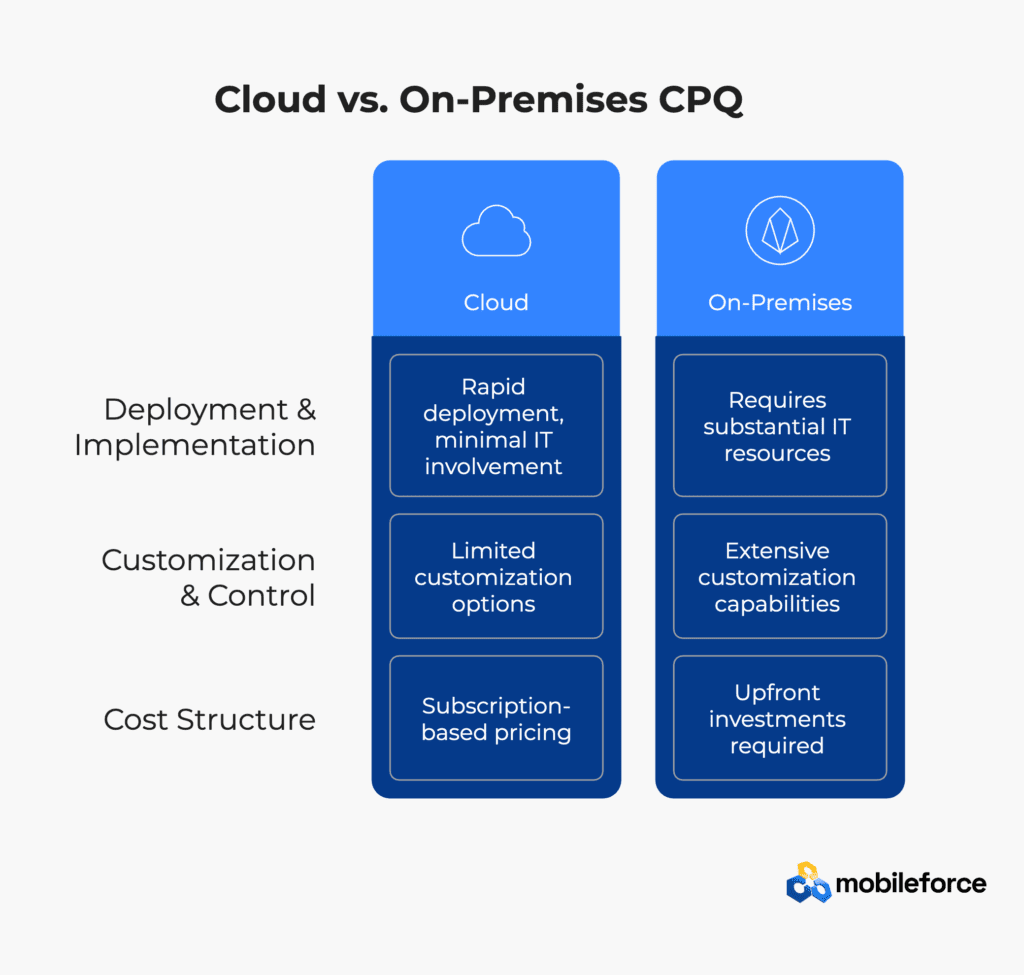
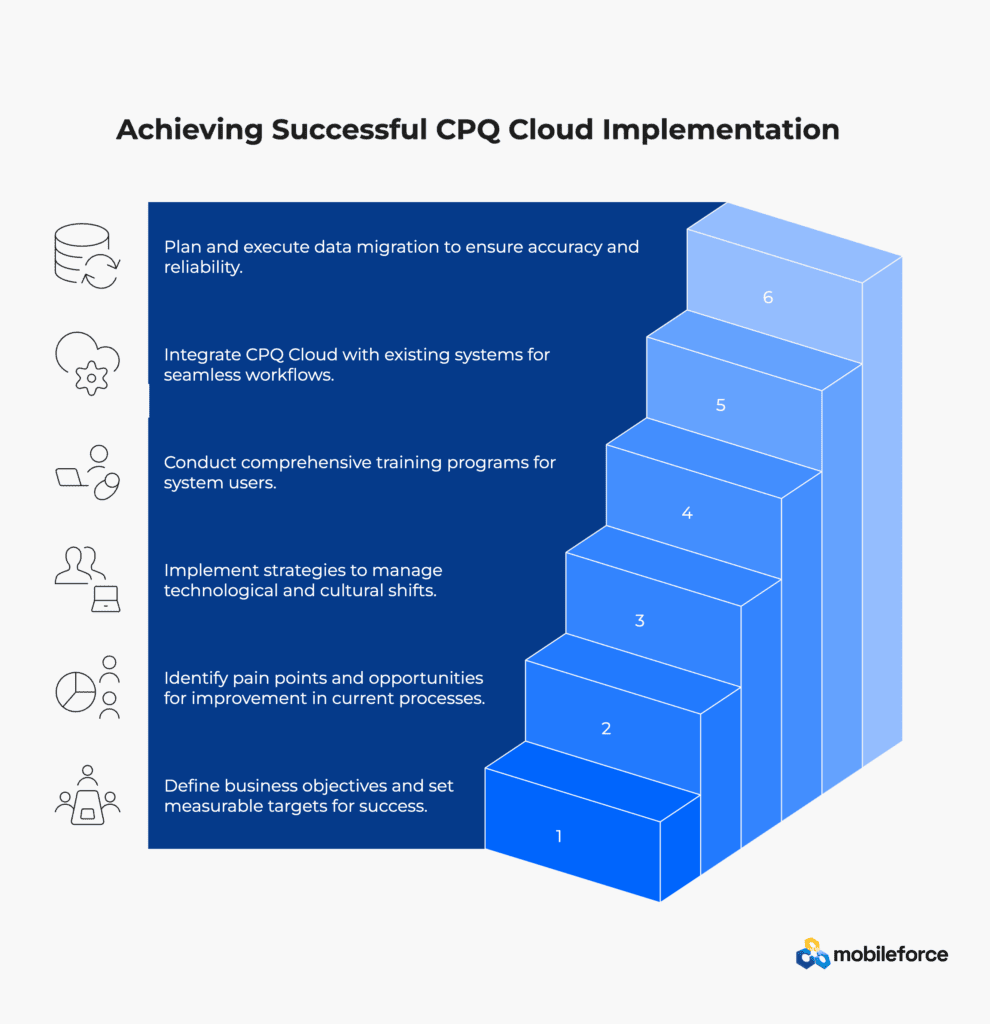
Implementation Best Practices
Strategic Planning and Goal Definition
Successful CPQ Cloud implementations begin with clear definition of business objectives, measurable targets, and specific outcomes. Organizations should establish baseline metrics for quote cycle times, accuracy rates, and deal sizes to measure implementation success.
Comprehensive business process analysis identifies current pain points, inefficiencies, and improvement opportunities that CPQ solutions can address. Stakeholder alignment ensures that implementation goals support broader organizational objectives and receive appropriate support.
Change Management and User Adoption
Effective change management strategies address both technological and cultural shifts required for successful CPQ adoption. Cross-functional teams representing sales, finance, operations, and IT ensure comprehensive perspective during implementation planning and execution.
User training programs should be role-specific and comprehensive, covering system navigation, configuration processes, pricing strategies, and approval workflows. Ongoing support and feedback mechanisms facilitate continuous improvement and sustained adoption.
System Integration and Data Management
CPQ Cloud platforms require integration with existing CRM, ERP, and financial systems to create seamless workflows and ensure data consistency. API-based integrations enable real-time data synchronization while maintaining system performance.
Data migration planning addresses product catalogs, pricing rules, customer information, and historical transaction data. Clean data preparation and validation ensure accurate system configuration and reliable operation from implementation.
Industry Applications and Use Cases
Manufacturing and Industrial Equipment
Manufacturing organizations benefit significantly from CPQ Cloud solutions due to complex product configurations, variable pricing structures, and extensive customization requirements. Industrial equipment manufacturers use CPQ to manage thousands of product options while ensuring technical compatibility and regulatory compliance.
Technology and Software Services
Technology companies leverage CPQ Cloud platforms to manage complex licensing models, subscription services, and professional services offerings. Software vendors use CPQ to automate pricing calculations for multi-tier licensing while supporting various deployment models.
Healthcare and Medical Devices
Healthcare organizations implement CPQ Cloud solutions to manage medical equipment configurations, regulatory compliance requirements, and complex pricing structures. Medical device manufacturers use CPQ to ensure product configurations meet safety standards while optimizing pricing for different market segments.
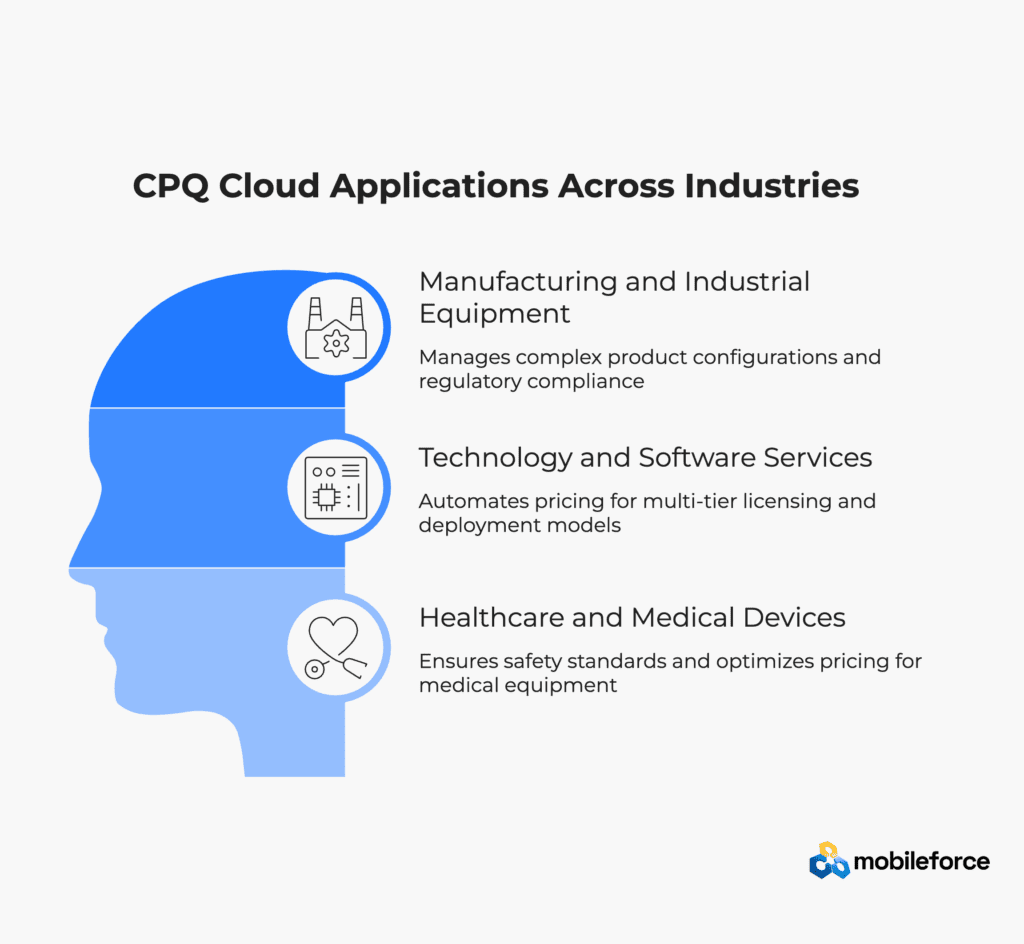
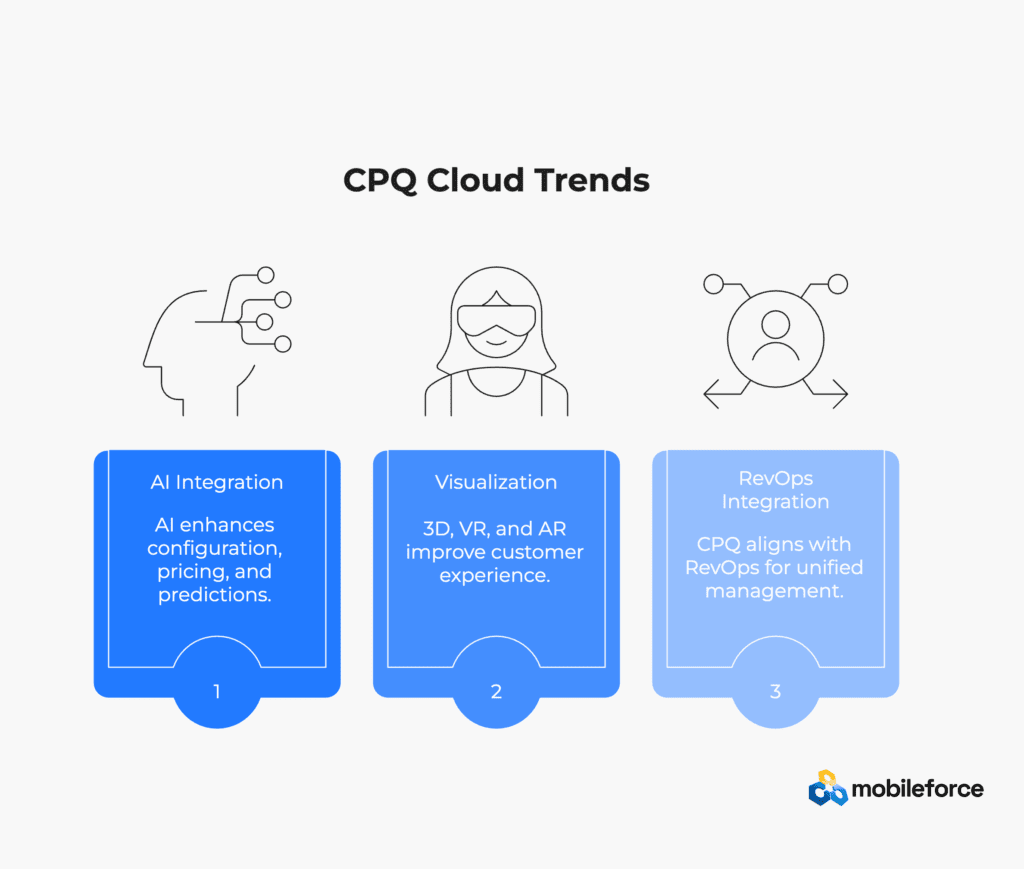
Future Trends and Innovation
Artificial Intelligence Integration
Advanced CPQ Cloud platforms increasingly incorporate artificial intelligence and machine learning capabilities to enhance configuration recommendations, optimize pricing strategies, and predict customer preferences. AI-powered guided selling helps sales representatives identify optimal product combinations while maximizing deal value.
Enhanced Visualization and Customer Experience
Modern CPQ solutions integrate advanced visualization technologies including 3D rendering, virtual reality, and augmented reality to provide immersive product configuration experiences. These capabilities enhance customer engagement while reducing misunderstandings about product specifications.
Integration with Revenue Operations
CPQ Cloud platforms increasingly align with Revenue Operations (RevOps) frameworks that integrate sales, marketing, and customer success functions. This evolution creates unified revenue management systems that optimize the entire customer lifecycle from initial engagement through renewal.
Conclusion
CPQ Cloud represents a fundamental transformation in how organizations approach complex sales processes, offering significant advantages over traditional on-premises solutions through enhanced flexibility, reduced costs, and improved scalability. The cloud-based approach enables rapid implementation, automatic updates, and seamless integration with modern business systems.
As businesses continue to embrace digital transformation and remote work models, CPQ Cloud solutions provide the accessibility and agility necessary to succeed in competitive markets. Organizations evaluating CPQ solutions should prioritize cloud-based platforms that offer comprehensive functionality, robust security, and proven scalability to support long-term growth objectives.
